Rami Ismail is a game development consultant, game developer podcaster, and a budding airplane pilot. You can find him on Twitter at @tha_rami.

2021 is over, for better or worse.
Let’s get two things out of the way. First, I did not play Halo Infinite. Since I was 13 years old, I have played every single Halo campaign we could with the same group of friends, in co-op. Halo Infinite does not have co-op campaign yet, which means we’re waiting until we can play it together. Second, I’ve been a bit of a mess so this list is going to be a bit of a mess.
For me, it was an odd year: I started The Habibis with Fawzi Mesmar and Osama Dorias, a games podcast by three Arab game developers, and finally found the Arab home in games that I’d unwittingly been looking for. My post-Vlambeer sabbatical year turned into more work than I’ve ever done before--but for the first time in my life as a game developer I can’t actually talk about a lot of the things I’m doing. It was a remarkable year for me in work, but my personal life felt more like a train derailing off a bridge into a ship that sinks onto a submarine causing it to launch a ballistic missile into an airplane, and then the airplane crashes onto the derailed train, and the plane is carrying a nuclear bomb.
So, inspired by a thousand hours of Flight Simulator and a healthy amount of sadness, I guess I decided to actually train and become a pilot. When I was a wee six-year-old, I had the dream of becoming a pilot, but I’d been told that glasses would disqualify you. I needed glasses, and refused to wear them out of fear I could never become a pilot, until my parents convinced me that wearing glasses would make me more intimidating at the elementary school chess tournament. I won that tournament, so the glasses stayed, and the dream of aviation went.
Turns out the glasses thing is nonsense, so I took some flight classes in my early 20s, but had to drop out because first I couldn’t afford it, and when I could it was because I accidentally started a games studio, so I didn’t have time anymore. And thus, near the end of 2021, I decided to just try another flight class. I’ve been happily flying a Cessna 172 twice a week, weather permitting. It’s been wonderful. Really makes you appreciate how good Flight Simulator is. Also how expensive Flight Simulator is--between the peripherals and now the actual real-life flight training, I don’t think any game has ever cost me as much as that one. “It’s free on Game Pass,” my ass.
Anyway, beyond all that, luckily, there was a surprising amount of video games. I honestly did not expect much of 2021 in games--a new console generation in the middle of an airborne pandemic seems like a place to tone down your expectations, but it was far from necessary: The industry delivered and indie flourished in the space left by many big releases quietly or publicly postponed.
Best Game: Unpacking

Unpacking is a singular type of game--it is painfully straightforward, expertly executed, and laser-focused on its emotional resonance. It is a reminder that the games industry is this towering skyscraper of culture and expectations--choices that reach back decades in time and that defined the path forward--and that sometimes the most beautiful things are found on the grassy field right next door.
Unpacking has no central conflict. There is no failure state. There is no death, no game over, no enemy. There is her items and the place she’s moving into, and you are her. There is no story, beyond the items and the spaces. And yet, by bringing along her ever-increasing collections of figurines and books, the items that stay and those that disappear--Unpacking is by far the most effective video game and video game narrative I have played in a long time. If games are defined by finding meaning in interaction, in their use of rules and constraints to evoke emotions, in their ability to allow players to temporarily be someone else or have different options or problems--Unpacking is as close to a perfect video game as you can possibly imagine.
I played Unpacking thrice this year: the first time when it came out, as I had followed Witch Beam’s game since I was first shown it years ago in development--and I thought it was brilliant.
I teared up for who I was in Unpacking, as I slowly realized there would be no space for me to hang her diploma anywhere in the level--her proof of an achievement I knew she had worked towards for so long. I ultimately had to store it under the bed of the uncompromising and unhelpful partner she was moving in with--a moment so singularly brilliant that that one click made Unpacking my Game of the Year. I teared up again--now of happiness and relief--when the next level was two years later, as she unpacked her items back into her childhood room, eyeing a very obvious open space on the wall, and I cheered when the diploma came out of the box and went straight on the wall. Not a single word was spoken or written, and you knew exactly who she is, who he was, and why it did not work out.
The second time I played it was later in the year. My 2021 was partially defined by an incredibly difficult break-up, and after I spent weeks slowly sorting in my apartment through what artifacts and memories were left here of her, finding some strength each day to pack a few more items into a box. It all made the digital acts and beats of Unpacking incredibly resonant--to the point of feeling a little too soft to continue playing. I had an unembarrassed cry once more as I realized that the game was really telling me that it would all work out--that packing away the remains of my relationship would not be the end of my story--just of that story. It was an oddly needed reminder.
Unpacking allowed me to bring my feelings into the game, allowed me to feel for someone I am not, allowed me to overcome her issues, and then fed the reassurance it gave her back into my life.
And that brings me to the third time I played Unpacking, while writing this list, to help me answer a question that was critical to me figuring out whether Unpacking could be my 2021 Game of the Year: What defines a Game of the Year? Is it the game that affects you most? The game that was most effective at using the medium? The game that was the most impressive craftwork? The game that maintained the most focus on its goals? The game that reminds us that there is more to gaming than winning? For me, it didn’t matter much: for each of these definitions, Unpacking is my Game of the Year.
Best Touch: I already mentioned it, but let me repeat it: the diploma. It is a masterclass in game design. It is the purest form of game. It is narrative and mechanics molded together so well that you feel how wrong it is as you play, and the meaning hits you like a truck. It is perfect. It is flawless. It is the video game moment of the year.
Least Favorite: Witch Beam is uncompromising in their design, and despite effective focus on accessibility, every now and then the game feels like it is trial-and-error--a minor gripe mostly magnified by how smooth everything else is.
Alternative: Inscryption is a straightforward card game. Then it is not.
Inscryption got absolutely robbed this year--if it wasn’t the year of Unpacking, maybe the year of Loop Hero, Inscryption would’ve easily been Game of the Year. How can a card game stand out in atmosphere? In narrative? How can a card game be unnerving, scary, surprising, thrilling? I don’t know, and before Inscryption I would’ve had a hard time believing it.
Inscryption ever-so-slowly lures you in with a relatively straightforward card-game. You play some creatures with attack and defense stats, and a summon cost that you pay by sacrificing some cuter creatures. Maybe you brutally drain the blood from some squirrels. Before you know it, the game has become something else entire. Something uncomfortable. Something alluring. Something tense.
I would talk more about Inscryption, but I refuse to. That the game will surprise you isn’t much of a spoiler, but talking about how it will surprise you is. Go play Inscryption--what is the worst that could happen?
Best AAA: Hitman 3
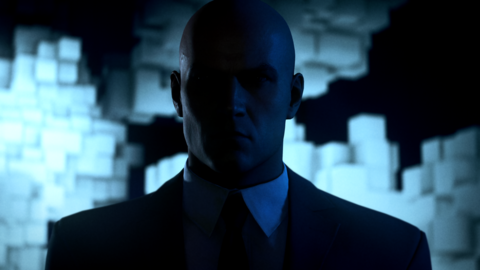
Hitman 3 is Hitman at its very best, and the funny thing about that is that I was never a huge Hitman fan. I enjoyed the games, but to me they were always short distractions between the previous game and the next--interesting sandboxes focused on creating emergent situations amidst cleverly designed scenarios. I played Hitman because they are masterclasses in layered level design, and as a developer, I guess I love being schooled by the games I play.
Hitman 3 is IO Interactive doing something that is incredibly rare in games: making a good third game in a series. Of course, they had quite a bit of “Hitman” in their past, but Hitman (2016) was a risky reboot in so many ways that you can easily say they worked their way back up from scratch. Normally, when a developer does a very risky first game that works out well, the cadence will often describe something like this: the first game has great ideas but isn’t executed well--but it does well so a second game is commissioned. The second game has all the coolest ideas executed well, because the team has some freedom, some ideas left that didn’t make it into the first game, and a clearer understanding of what they’re making.
That game then becomes so big that the suits come in in full swing, and the third is developed under enormous pressure or simply pushes it too far as the good ideas have ran out. Think about it: Assassin's Creed, Mass Effect, Dead Space, BioShock, Half-Life. The first game is good but wonky, the second is incredible and solid, and the third disappoints because the money suits have shown up and the developers are under tremendous pressure to deliver better ideas despite having used all the good ones of the second game already, and they’re on tighter deadlines because the money is needed next fiscal year.
Not Hitman. Hitman shows tremendous restraint where it needs it, and absurd levels of whatever the opposite of restraint is in others. There is no world where Dartmoor, a level in a mansion that can play out either like a Hitman mission or Knives Out: The Video Game, was a necessity to development. It is clear IOI knew what they were doing, and enjoyed themselves tremendously creating some of the scenarios and situations Agent 47 can land in.
It also shows that this formula might have run out: they can make more, but I don’t think they can do better. I would love to be proven wrong, but it feels to me like the developers squeezed every possible bit of lateral thinking out of this one--they both present that Knives Out level, traditional Hitman levels in every meaningful configuration from open fields and farmlands to rooftops and skyscrapers, and even manage to include a straightforward and linear shooting gallery on a train. Hitman 3 pushes Hitman far beyond any reasonable expectation in all the best ways.
Best Touch: I’ve mentioned a whole bunch above, but Hitman 3’s Dartmoor level is a video game highlight. That level sits next to Titanfall 2’s Effect & Cause as a level that should not exist because there is no reason to spend that level of work or resources on a one-off, but clever management and diligent production made it possible to make something like that without damaging the rest of the title.
Least Favorite: It might seem petty, but I am just very tired of this one. IO Interactive made the one mistake that I simply cannot forgive: the original release had Arabic rendered backwards on certain signs in the Dubai level--a sign that there was a lack of care to ensure Arabic was implemented correctly. Despite the fix after several Arab players pointed this mistake out, it still hurts my (half-)Arab heart to have to call this sort of stuff out. It also emphasizes just how good Hitman 3 was: despite all that, Hitman 3 is still my favorite AAA game of 2021.
Alternative: Metroid Dread is the most linear Metroid game that feels like a Metroid game regardless. Every step you take in Metroid is designed to happen exactly as the team intended, but it hides that so well that you don’t even care. Dread is beautiful, engaging, and challenging in a great way. And no, we're not going to argue whether this is AAA.
Best AA: Bowser’s Fury
Bowser’s Fury is the most fun I’ve had in an open-world in forever. It is one giant epic boss fight spread across a dozen hours filled with delightful puzzles and you play with the best iteration of Mario camera and movement in forever. That’s it, that’s the whole story. I don’t know what more to tell you. I can tell you about the giant Super Saiyan Lion Mario, but it doesn’t matter much in the large scale of how good this game is. I can tell you about the wonderful integration of Bowser Jr. as an accessibility aid and multiplayer opportunity, but it’s icing on the cake.
Best Touch: It genuinely feels fresh, and that’s not something you expect out of a Mario game.
Least Favorite: Every now and then, the game ends up feeling a little disjointed--but I found the occurrence incredibly rare. The final final boss fight was a little underwhelming-you’d hope for something a little more creative than "the same thing but spookier."
Alternative: NieR Replicant is so much better than the original it is a remake of that it might as well be a different game in terms of how you play it. If you’ve played NieR before, this is a superior version. If you’re joining from NieR Automata, this will mess you up the same way. And if you’ve never played a NieR game before--well, Automata is better, but Automata is also one of the best games ever made. Pick whether you want to play the better Automata first or second, but I think it's absolutely worth playing both of them.
Best Atmosphere: Persona 5 Strikers
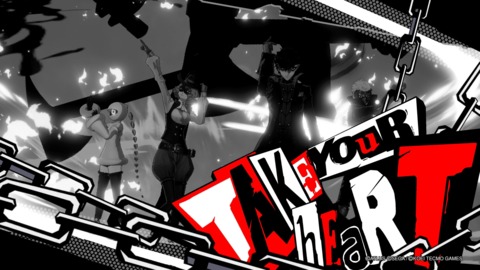
Persona 5 was my AAA game of the year in 2017, and I wasn’t sure about whether I wanted to play Strikers: after all, a mere spinoff of such a brilliant title was sure to disappoint, and the experiment of making it a Musou-like (sorry) game seemed arbitrary and odd. Persona 5 was about strategy, not about surviving overwhelming numbers.
It’s good, then, that I played Hyrule Warriors and Fire Emblem Warriors and loved them both, and had garnered a lot of respect for Omega Force’s ability to translate any game into a Musou-like (sorry). And Persona 5 Strikers 100% captures Persona 5--from the tone to the characters to the gameplay, despite being an entirely different genre of game.
And what an implementation it is. Fast, furious, strategic--the Musou-like (sorry) gameplay switches to turn-based combat in a flick of a button, and before you know it you’re just… playing Persona. You pick your attacks and swoosh, you’re back into the hack-and-slash. Somewhere deep down I know that it’s two different games smashed together, but like all things Persona 5, it’s done with so much bravura that you can’t help but feel it’s one thing.
Persona 5 was as loud as you could imagine, and while Strikers ramps up the loudness even further (down to some rock versions of the already memorable soundtrack) it somehow also manages to find more heart than the original. The two new characters that join the crew in their new mystery are fun, and I did not even once feel that the fact that the Phantom Thieves had to return to their thieving ways was contrived. The trip was lovely, the twists twisty, and the genuinely sincere naiveté of the crew makes for a more balanced genuinity. By the time the credits rolled, I honestly could not imagine Persona 5 without Strikers.
Best Touch: When I was done with Persona 5 Strikers, I genuinely remembered Persona 5 as if it had Strikers’ gameplay. The transfer between atmosphere, gameplay, strategy, and feel was so smooth that the Strikers gameplay mapped perfectly onto my memories of Persona 5. When I looked up Persona 5, the gameplay of the original mapped perfectly onto Persona 5 Strikers, and I had to make an effort to remember the hack & slash gameplay there. There is an incredible level of craft at display here, two games in two genres effortlessly feeling like the same thing.
Least Favorite: I enjoyed almost every minute I got to spend with the Phantom Thieves, but every now and then the random side-quests got really exhausting.
Alternative: Get in the Car, Loser feels like Christine Love’s take on Final Fantasy XV, which means it’s an incredibly queer road-trip, and it’s an incredibly fun RPG with a super solid atmosphere.
Best Emergent Territory: OPUS: Echo of Starsong
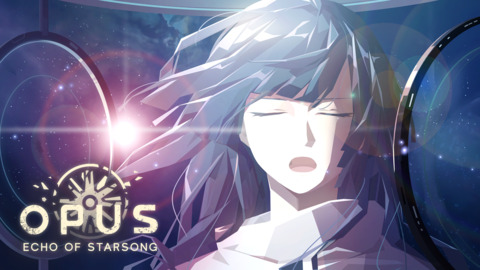
Let me preface this by saying I am biased.
Half a decade ago I was on one of my many journeys around the world to meet independent developers everywhere. By then, it had become my life’s goal to ensure anyone, anywhere would be able to make games with (at least) the same opportunities and support developers benefit from in the West. I spent a good 300 days of the year on the road, flying from continent to continent meeting developers, teaching them, and learning from them. I meet people, then ask them if there is anything I can help with, and then try and help.
One of my favorite things about that work was meeting developers, and learning of the work they’re doing both in terms of making incredible games, and helping others make games.
Opus: Echo of Starsong is an example of an incredible game--but when I met the Taiwanese SIGONO team at an independent developer event in Shanghai, they were working on an earlier game called OPUS: The Day We Found Earth.
OPUS: The Day We Found Earth was a mobile puzzle game focused on narrative, a clever game far beyond many similar games that were released prior to great acclaim from Western developers--developers with direct access to the Western media, media which did not and often still does not have eyes on regions on Earth outside of North America, Europe, and Japan. It pains me that so many incredible games go undiscussed every year, not because they’re not great, but because the audience has no way of knowing they exist--and the media can’t make the effort because it’s expensive and there’s enough releasing to fill the page where they are.
So when I met these developers, it became clear that they had one big dream: to one day break through in the Western media, and have the game be recognized there. The Day We Found Earth won award after award in mobile--where award ceremonies are far more international in general, but the game did not break through in the West. A sequel, OPUS: Rocket of Whispers was a similarly clever mobile game, also won several awards--but did not break through.
Perhaps a little desperate, SIGONO decided to make their next sequel a ‘big one’ - and that is OPUS: Echo of Starsong. Starsong is a PC game, focused on the strengths of what is now a franchise--a rich sci-fi universe filled with clever puzzles and exploration, melancholy and hope, desperation and love. They poured everything they had into Starsong, and it shows: it is by far the best Opus title, and one of the best narrative experiences of 2021.
Near the end of development, I caught up with the SIGONO developers and asked them what their hopes for the project were--if there was anything I could help with. They said they would love if I could help them reach the Western media. Their dream had not changed. I tried to help, as I would try to help any developer with games as good as theirs. We talked about their press release, we discussed the trailer and moved around some and cut some, we discussed timing and strategy. They were feeling very good about the game, and even the earliest cut of the trailer gave me goosebumps.
When the game launched and I finally properly played it, it was as incredible as I hoped--beautiful and moving, full of care and love, a game that can stand alongside some of the greatest narratives in games. On the shoulders of the game rode the hopes of a studio that had chased one dream for half a decade with tremendous competence and focus.
But there was nothing.
A few smaller websites wrote about OPUS, but the websites you and I would know never mentioned the game. A week went by. Then another, and another. OPUS performed well enough, not wonderful, but presumably well enough to look at a future for SIGONO.
The dream of one day reaching the Western press and market would stay out of reach.
So when Sisi Jiang of Kotaku wrote a review that concludes that “Opus: Echo of Starsong is a serious contender for my game of the year”, I sat at my computer and cried. Honestly, just thinking of seeing SIGONO’s incredulous and excited response to the review, I still cry. They did it. They finally did it.
OPUS: Echo of Starsong is an incredible game. It is one of the best games of the year. It is beautiful, and moving, and absolutely worth your time. It ended up with just 5 reviews on Metacritic--the Western press sadly didn’t pick up on it much more than Sisi and those few smaller outlets did. But Echo sits at an impressive 88 on Metacritic, and over 3000 Steam reviews say the game has received an Overwhelmingly Positive response.
So many of the best developers I meet are incredible humans--kind, intelligent, empathic, focused, hopeful--they’re dreamers and workers that bring so much energy to their job for years to give you those 10 hours of wonder. This game reminds me how many incredible games by incredible people must be out there, unacknowledged, uncelebrated, just waiting for that one moment that will make the world see it, play it.
Best Touch: OPUS continues its series trademark of being one genre, but not like you’re used to. Echoes of Starsong manages to continue that beautifully--being many different things at once, yet mostly coherent. It is hard to overstate how impressive that is in the context of game development craftsmanship.
Least Favorite: OPUS occasionally trudges through the heft of its own world and story, and while at times that makes absolute sense, the game would’ve not been hurt by being slightly more streamlined at times.
Alternative: Eastward is charming and wonderful, and the Shanghai-based Pixpil pulled off a sincere homage to nostalgic RPGs without ever really feeling like it had nothing of its own to say. It is also gorgeous.
Most Whimsical: SPOOKWARE
2021 was the year in which my Analogue Pocket finally arrived - a Game Boy-shaped device that does hardware-level emulation of the Game Boy Advance. I had pre-ordered it to replay Golden Sun--one of my all-time-favorite games, but the Analogue Pocket made me grab my entire Game Boy collection to see what else I wanted to play. I found plenty: Advance Wars, Mega Man Battle Network, Monkey Puncher, Fire Emblem, Final Fantasy Tactics, and a bunch of others. There was one other Game Boy Advance game that I really wanted to replay: WarioWare, Inc.
I have played every WarioWare game, and while they’ve generally been ‘good or better’, the most recent release on Switch really wasn’t what I was looking for: the beauty of WarioWare to me was always quickly figuring out what to do, how to do it, and then executing on it. The latest one kind of flipped the script on that: you would know your mechanics already, just not how to apply them. It’s a fun two-player game, but it didn’t hold my interest beyond that.
It was to my surprise that I found my fix of minigame madness somewhere else--SPOOKWARE. SPOOKWARE is a skeleton-spooky indie take on WarioWare. Three ‘skelebros’ go on a coming-of-age journey, you move around the various locations you visit, and you play microgames to progress a rather whimsical story--and almost every part of this entire thing is full of horror movie tropes and references.
Just like in WarioWare Inc., the games last seconds, are wildly creative, use limited inputs, have an incredible amount of charm and joy and fun, and will make you grin, smile, yell, and shout at the game.
Is SPOOKWARE the best game of the year? No, not even by a long shot. Does it feel precision-engineered to be one of my favorite games of the year? Absolutely. Anyone that loves WarioWare Inc., or horror movies, or creative minigames, charming characters, fun, joy, or video games in general - anyone who loves any of those things should give SPOOKWARE a go.
Best Touch: I had to replay WarioWare Inc. to figure out if WarioWare hit the same level of charm on their ‘instructions’/’completion’ texts, and while WarioWare is charming, I actually think SPOOKWARE outdoes its inspiration here.
Least Favorite: SPOOKWARE wants to both be snappy and meandering at the same time, and it occasionally gives you a sense of whiplash as to what the game actually is.
Alternative: The Artful Escape is genuinely incredible--but somewhere I feel this game is going to resonate mostly with creative folks. Everybody I’ve talked to that is a creative fell deeply in love with The Artful Escape, as it perfectly encapsulates part of the identity crisis that being a commercial creative brings along--a fight between individuality and expectations, between converging and diverging, between genuine sincerity and practical cynicism. The Artful Escape also contains a design subversion that is so singularly well-executed that I do not want to spoil it: let’s just say it contains a moment that you’d expect somewhere else in the game, which is placed in line with the narrative of self-discovery and identity in such a beautiful way that I had to put my controller down and stare at the TV in awe for more than a moment.
Best Multiplayer: Destiny 2
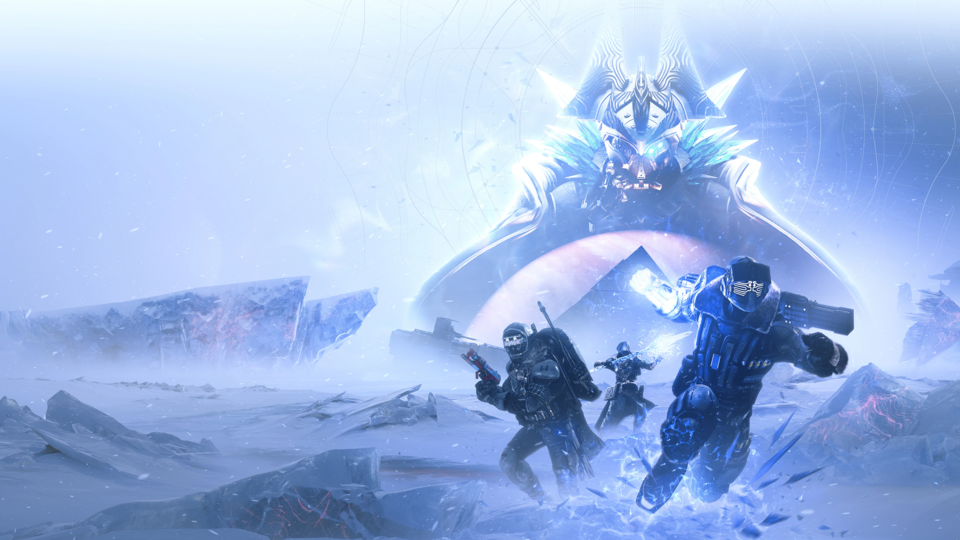
Destiny remains my end-of-day destination for every day that my PS5 is around, and Beyond Light/30th Anniversary Edition remains the best iteration of Destiny since its original launch. The current version of Destiny also shouldn’t be mistaken as an expansion pack--it is effectively an entirely new title. 2021 brought new progression mechanics, added an entire new end-game fashion system, smoothed out entire subsystems to make Destiny more coherent and focused, and worked tirelessly to both do what the community wants and what the community doesn’t know it wants.
The most recent storylines have had more momentum and gravitas than Destiny has had before, as unlikely alliances are formed and threatened in the face of overwhelming odds. In the most traditional Star Wars storytelling tropes, the player is forced to question the duality of good and evil in power given, and then spends the rest of the year forming alliances with those that were foes a year earlier.
After you beat the campaign, Destiny 2 keeps evolving the story through weekly narrative moments, to tell the story of the deceptive Hive goddess Savathun, and the eternal Starhorse potentially representing the consciousness of the planets that really wanted to have a TV game show featuring our main character narrated by their mysterious shadowy tentacle-faced servant.
Alternative: Outriders. Remember Outriders? Good game. Just really solid action-game design, great narrative conceit and opening, and mostly held back mostly by somewhat unimaginative encounters in the later parts of the game. Really loved how ridiculously overpowered the player gets.
Best B-Game: Babble Royale

Babble Royale is a Scrabble Royale Battle Royale game. I don’t even know how to begin to explain this game, but we’ll give it a go. You play a version of Scrabble simultaneously and in real-time with almost 20 players - the game starts as your drop your first letter onto the field, and from there you use Scrabble rules, but you have to continue from your own words, and there’s power-ups, and if you connect your ‘chain’ to enemy player, they’re eliminated, and there’s also an ever-encroaching ‘circle’ that damages you if your latest word is outside of it.
If it sounds like absolute lunacy, that’s because it is--and I honestly only gave it a try because Frank Lantz’ name was attached to the project. His previous work includes Drop7, Hey Robot, and Universal Paperclips--and I love all three of those games.
Babble Royale, then, too, I fell in love with. There’s something oddly charming about taking out an opponent with a complex word, or an insult, or a banal word. There’s something incredibly exhilarating about barely making it out of the circle. There’s something remarkable about maneuvering yourself out of danger. It has many of the ups and downs of a Battle Royale, but it’s Scrabble.
Best Touch: In continuing with the theme of absolute absurdity, then, Babble Royale allows you to buy skins just like most Battle Royale games do. In Babble Royale, your skins are your starting letter. I bought the premium package so I can start with the letter “R”. I do not regret it.
Least Favorite: A good tutorial would genuinely be nice. Babble Royale might be straightforward, but it also makes you miss a whole bunch of things that are good to know, and don’t feel particularly rewarding to learn about later. Onboarding remains a particular challenge that indies struggle with, and while Babble Royale is accessible by proxy, it doesn’t exactly feel like it welcomes people in.
Alternative: Severed Steel is just utterly gleeful. Think three-dimensional John Wick Hotline Miami Max Payne. Think fast, loud, confident, fun. Think kicking in doors and sliding on floors and shooting bad guys in spectacular ways as you zoom through the air. It’s good.
Best Indie: Loop Hero
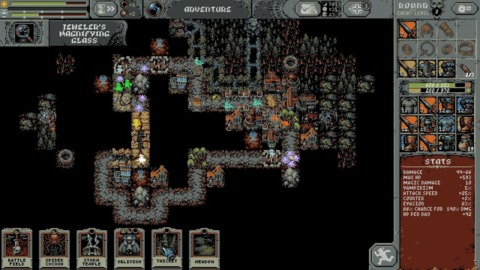
I had to delete Loop Hero from my computer. Loop Hero is too good a game. The way it subtly inverts the relationship between risk and opportunity is brilliant. The way the graphics are both informative and evocative is beautiful. The way it can lure you into another loop by enticing you with opportunities is conceptually staggering. I do not wish to speak of Loop Hero, before I am tempted again.
Best Touch: Since Loop Hero is about risk and reward, there is no singular moment that captures that tension better than standing at the campfire, deciding whether you’ll go another loop. It is a beautiful symphony of permutations and possibilities, an informed gamble in the purest form, and it frequently pokes at that one feeling other media than games can’t really evoke: regret. The same regret that I'll feel if I boot the game back up and lose another three weeks of my life.
Least Favorite: Loop Hero has almost perfect onboarding. It explains itself, lets you play, and then reveals itself through practice, and failure, and paying attention, and a slow unfolding of mechanics. That said, I really wish the game let you choose a character right from the start.
Alternative: Ynglet is a top-down platformer by the worlds’ politest indie rockstar, Nifflas. If ‘top-down platformer’ sounds like a curious thing, you’d be correct. Ynglet is meditative and wonderful.
Best Mobile: Fantasian
I want to be abundantly honest here: I didn’t love Fantasian--I just thought it was incredibly well done. If you’re in the running for a RPG with an accessibility twist, Fantasian is beautiful and impressively crafted for mobile. If you don’t have an iOS device, you’re sadly out of luck on this one.
Best Touch: The “dimengeon” mechanic can be lifted into every RPG ever as far as I’m concerned. You trap weaker enemies into some sort of alternative pocket dimension, and when it overflows you fight everything caught in there at once in one battle.
Least Favorite: I feel terrible for saying it, but Fantasian is stunningly unremarkable in most ways beyond the Dimengion. If you like Final Fantasy, you’ll like Fantasian. If you don’t like Final Fantasy, you won’t like Fantasian. If you feel you would like Final Fantasy but find it a little too much ‘work’, you might love Fantasian. That’s kind of what the game is.
Alternative: Bird Alone is absolutely a cheat choice here, because it came out in 2020. Regardless, I played it early in 2021, and I simply have to talk about it. The best way to play this game is knowing as little about it as possible, but if you could stand to have a little overexcited bird friend join your life for just a while, I can deeply recommend Bird Alone.
Best …: Mass Effect Legendary Edition
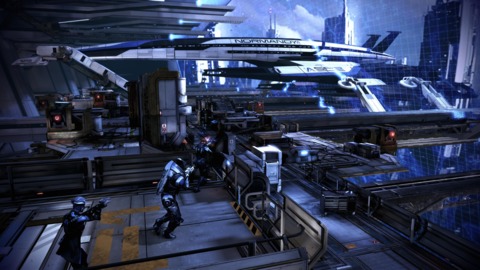
2021 felt like it should’ve been a slow year for games--a new console generation and COVID make for a rather challenging combination for game development. Somehow, the industry pulled off an incredible feat by filling the year with more than enough incredible games to say that 2021 was a good year for games. As we look to the absolute onslaught of titles slated for 2022, I genuinely look back with amazement at what the industry has pulled off. Well done, y’all.
This category I always leave for the end, to talk about a game I feel doesn’t really fit a category but does deserve a mention. But I also use it as an excuse to not have to care about any limits, so let’s talk about all the games I would recommend that didn’t make it onto the list first.
We properly kicked off the new generation of console games with the graphical absurdity that was Ratchet & Clank: A Rift Apart. We went on thoughtful creative journeys in both TOEM and Chicory. We went Skatebirding in Skatebird, took a glide across the world of Sable, and drifted around the stunning Mexican vistas in Forza Horizon 5.
I toyed around with Townscaper, which I don’t know how to mention anywhere in-flow in this section so I’m just going to do it this way. Maybe I can create some far-fetched bridge to ‘building things’ and mention Game Builder Garage in here as well--it’s a genuinely good on-boarding tool for young and aspiring game developers.
I jumped back into Tetris with Tetris Effect: Connected for some multiplayer Tetris, played It Takes Two and came away impressed by the continued co-op design expertise, and honestly would’ve believed I was playing with friends while I was playing Guardians of the Galaxy--that’s how good the characters in the game were.
JETT: The Far Shore’s opening is seared into my mind, the engine thrust accelerating as time ticks away, even if much of the rest of the game didn’t quite click with me the way I hoped. Death’s Door surprises as an action-adventure clearly made by a team with serious capacity in the art department, but with far deeper combat than you would expect. Unsighted was a significant and deceptively dense take on the genre, and Axiom Verge 2 was a phenomenal Metroidvania with Axiom Verge’s trademark focus on coherence and philosophy.
And then there were the roguelikes. There are so many roguelikes, and while the quality is highly variable, this year had a whole bunch of incredible ones. Curse of the Dead Gods is really good from the get-go, but I had to put the game away because I couldn’t commit the time. Deathloop is a delightful kind of narrative roguelike, but also kind of not, and somehow manages to stay focused through the odd-yet-enticing two-and-a-half-A experiment almost all the way to the end. Returnal really needed that save function, and I simply haven’t had the time to go back to it after they implemented it--but I loved what I had played when I put the game away--I hope to one day have some time to hop back in and play that properly. Wildermyth was a procedural tactical RPG that was a complete surprise to me, and I really appreciated just how granular the experience felt and how sincere the characters felt. And if you’re reading this and you liked Nuclear Throne--consider giving Dead Estate a go. I had a blast.
I went on stylish noir-esque adventures--say, noir-likes (sorry)--in Vancouver in Backbone, and then throughout the universe in Genesis Noir.
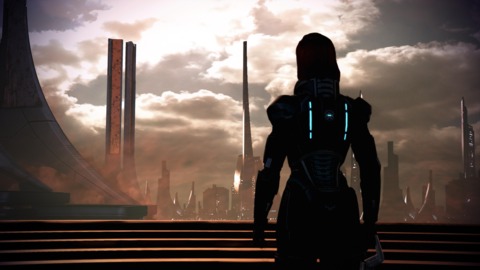
But the trip through the universe I want to talk about is Mass Effect.
Mass Effect is a very strange game for me. When the first game came out, I did not know that game development was a real career. When the second game came out, I was studying game development. When the third game came out, I had dropped out of university, started Vlambeer, been nominated for several huge awards with Super Crate Box, and had been featured with a photo in the New York Times as a spokesperson against cloning.
The one thing that had stayed normal as my life flipped upside down was that I wanted to know how the story of my Commander Shepard continued. The characters of Mass Effect are friends, comrades, colleagues. I have never before been so enamored with a game world, and despite having played games that are better, and grander, and more beautiful, I honestly doubt I ever will love a game world more than that of Mass Effect. Most importantly, I firmly believe The Normandy is the very best instance of a ‘home’ in any video game--a place to feel safe at, to be with friends at, to come home to. The Normandy sits in my memory as one of the greatest achievements in video game history.
When I finished a Mass Effect game, I never touched it again. When I completed the trilogy, I never went back. The story had played out, and the memory was so precious that I insisted to myself that it stay pristine. For me, the ending of Mass Effect 3 was perfect.
Mass Effect Legendary Edition is a phenomenal remaster of the original trilogy, and it was the first time I controlled Commander Shepard since 2013. I was amazed with just how much of the game had remained in my memory, and I played the game exactly the way I remembered it. I didn’t change my choices, besides now knowing how each decision would pay off. It all played out exactly as I remembered it.
The only change to my experience was that I played every Mass Effect game on launch day: I had never played a single DLC. They were my treat for this remaster, and several of them are utterly remarkable. I was at the edge of my seat as I played Lair of the Shadow Broker. I reeled from the implications of Leviathan. I broke down in laughter throughout Citadel. I broke down in tears at the end of Citadel, as the soundtrack concludes the content with the beautiful Farewell and Into the Inevitable, which unmistakably evokes the melodies of An End, Once And For All--a track that is burned into my memory for life.
Commander Shepard was the one stable thing as my life took me from a teenager with an impossible dream to the founder of a notable indie studio. Getting to come back to the Normandy again now, as a decade veteran of the games industry with a career far beyond the wildest dream of that teenager--I don’t know how to express in words how it feels.
It’s good to be home, huh, Commander?
Best Touch: It’s Mass Effect.
Least Favorite: Knowing myself, unless there’s a Re-Remaster, I will likely never play these games again.
Alternative: If you’re the kind of player that loves narrative games that don’t shy away from tackling some complex themes, The Forgotten City pulls you in and doesn’t let go until the very end.